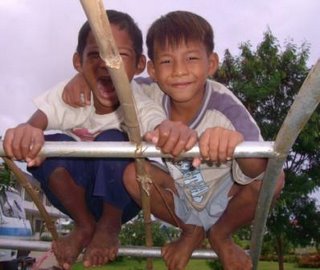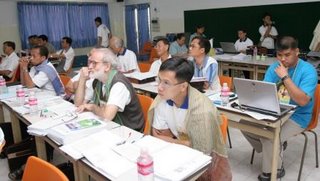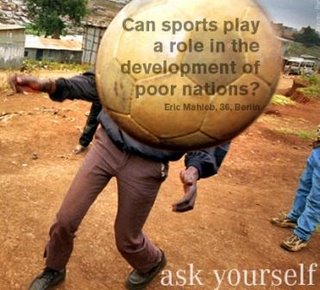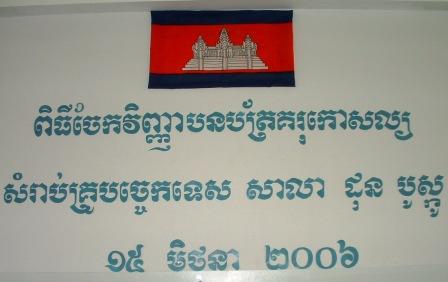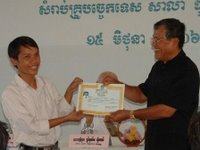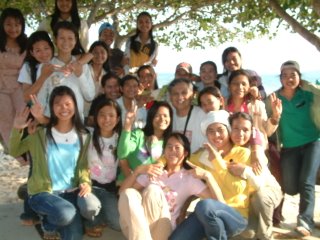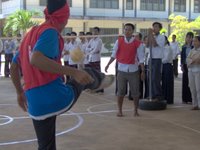Way back in the 2nd of February, 2006 the local khmer newspaper published this article about us here at Don Bosco Sihanoukville (original in Khmer):
More than 40 out of 400 students of the DonBosco Technical School a Non Government Organization located in Ou Pram Sihanoukville are facing the danger of being sent out of school and thereby preventing them to continue their skills program. This happened after the Representative of the organization and the Principal of the school did research and found out that more than 40 students were children of people who could afford and have the possibility to study at the University level in evening courses.
The plan to send away pupils who have done nothing wrong and having more than 40 students go out of the Don Bosco school without allowing them to continue their skills program was immediately announced. And it was just recently that the said organization has come up with the decision of not accepting students that can afford to study in the University. They cannot allow these students to enter Don Bosco School because it would take away this good opportunity from the poorer boys.
Aware of (related to) this decision of the Don Bosco school, those numerous students who had their names in the “send away” list informed the newspaper “Reasmey Kampuchea” crying that they have never failed to follow any order or rules given by the school and they had always followed school regulations to their best effort.
Also each one of them had fought hard to endure the painstaking misery and the difficulties of staying in the school - some for almost a year now, others for almost two years. That of being already near the end of their skills program and the immediate school decision makes this situation a horrible and profoundly sad one for them.
The same group of students continued saying that the Representative of the Don Bosco Organization and the Principal of the School accused the students that they are studying in the University in the evening courses and during the day they come to take the courses at Don Bosco. And so for this they must be sent away according to that decision of the school that has just been newly announced.
The students admit that their parents are not so poor. But they cannot afford to pay money for bachelor and master courses at the university. They take short and affordable (cheap) computer courses only.
If their parents had much money they would not even volunteer to endure the painstaking misery they are enduring these days in Don Bosco School. Perhaps they all would go to study in Phnom Penh or abroad without the need to come to seat down shedding tears as they are doing.
Therefore the President of the Don Bosco Organization and the Principal of the School, please, should consider these and be tolerant to allow them to finish their two year course for this year!
After hearing the situation (phenomenon) mentioned above, many parents and tutors of the Don Bosco students had this reaction, “They say: Don Bosco School shouldn’t view the students as poor or as rich at all. If the students were rich and they willingly observed all and every internal rule and regulation of the school all throughout this time- one year for some, almost two for the others, the Don Bosco School should give encouragement to these students because they now understand well how to live in society. They have changed their thought from bad, from mischievous, from only roaming around, vagabond and playboy, and have now become good young people. All this should make the Organization and the School proud to be able to change men like that.
As for sending away students and not allowing them to continue just in the middle of the year like this was not a good point. It has made all these young boys and girls broken-heart. It could cause them to go back to their old ways and be more brutal, more cruel, or worse than before.
The parents and tutors of all these more than 40 students of the Don Bosco School that have to face the situation of being sent away appealed to the Sihanoukville authority of the government of Cambodia, to please intervene and coordinate with the Don Bosco Organization for this situation (phenomenon). In order that their sons complete the skills program successfully and to ask the Don Bosco Organization to cancel this decision because that looks discriminating.
For now the “Reasmey Kampuchea” newspaper didn’t yet have any contact with the Don Bosco Organization in order to clarify the problem.
On the 7th of February, 2006, they sent representatives to contact us about the issue. Until now they have not written an article to correct their statements. 1. We never chased out anybody for an unjust reason; students (rich or poor) asked to leave are only disciplinary cases (and after having been given public warnings and having talked with their parents/guardians).2. We have only around 200 students. DB PNH has around 400.3. Students in Don Bosco are non-paying students - there is no tuition fee (why should the rich or those who can afford avail the slots intended for those less fortunate khmers? Is our fundamental option wrong?) Let's hope the more fortunate Cambodians help their fellowmen who are less fortunate not only in words but in deeds and instead of getting their place in such pro-poor institutions.4. Watch out for my next post for the aftermath of the this policy issue.



